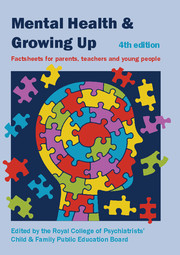Book contents
- Frontmatter
- Contents
- Contributors
- Factsheets for young people
- Factsheets for parents, carers and anyone who works with young people
- 1 Good parenting
- 2 The restless and excitable child
- 3 Dealing with tantrums
- 4 Children who soil or wet themselves
- 5 Sleep problems in childhood and adolescence
- 6 Behavioural problems and conduct disorder
- 7 Attention-deficit hyperactivity disorder (ADHD)
- 8 The child with general learning disability
- 9 Specific learning difficulties
- 10 Autism and Asperger syndrome
- 11 Depression in children
- 12 Worries and anxieties: helping children to cope
- 13 Divorce or separation of parents: the impact on children and adolescents
- 14 Death in the family: helping children to cope
- 15 The emotional cost of bullying
- 16 Traumatic stress in children
- 17 Domestic violence: its effects on children
- 18 Child abuse and neglect: the emotional effect
- 19 Drugs and alcohol: what parents need to know
- 20 Self-harm in young people
- 21 Psychosis
- 22 Schizophrenia
- 23 Bipolar disorder in children and adolescents
- 24 Obsessive–compulsive disorder in children and young people
- 25 Eating disorders in young people
- 26 Chronic physical illness: the effects on mental health
- 27 Medically unexplained physical symptoms
- 28 Chronic fatigue syndrome: helping your child get better
- 29 Parental mental illness: the problems for children
- 30 Who's who in CAMHS
19 - Drugs and alcohol: what parents need to know
from Factsheets for parents, carers and anyone who works with young people
Published online by Cambridge University Press: 02 January 2018
- Frontmatter
- Contents
- Contributors
- Factsheets for young people
- Factsheets for parents, carers and anyone who works with young people
- 1 Good parenting
- 2 The restless and excitable child
- 3 Dealing with tantrums
- 4 Children who soil or wet themselves
- 5 Sleep problems in childhood and adolescence
- 6 Behavioural problems and conduct disorder
- 7 Attention-deficit hyperactivity disorder (ADHD)
- 8 The child with general learning disability
- 9 Specific learning difficulties
- 10 Autism and Asperger syndrome
- 11 Depression in children
- 12 Worries and anxieties: helping children to cope
- 13 Divorce or separation of parents: the impact on children and adolescents
- 14 Death in the family: helping children to cope
- 15 The emotional cost of bullying
- 16 Traumatic stress in children
- 17 Domestic violence: its effects on children
- 18 Child abuse and neglect: the emotional effect
- 19 Drugs and alcohol: what parents need to know
- 20 Self-harm in young people
- 21 Psychosis
- 22 Schizophrenia
- 23 Bipolar disorder in children and adolescents
- 24 Obsessive–compulsive disorder in children and young people
- 25 Eating disorders in young people
- 26 Chronic physical illness: the effects on mental health
- 27 Medically unexplained physical symptoms
- 28 Chronic fatigue syndrome: helping your child get better
- 29 Parental mental illness: the problems for children
- 30 Who's who in CAMHS
Summary
What are the different types of drugs which cause problems?
The most commonly used, readily available and strongly addictive drugs are tobacco and alcohol. There are numerous others that can be addictive.
Alcohol and cannabis are sometimes seen as ‘gateway’ drugs that lead to the world of other drugs like cocaine and heroin.
Drugs are also classed as ‘legal’ and ‘illegal’. The obviously illegal drugs include cannabis (hash), speed (amphetamines), ecstasy (E), cocaine and heroin. Using ‘legal’ drugs (e.g. cigarettes, alcohol, petrol, glue) does not mean they are safe or allowed to be misused. It just means they may be bought or sold for specific purposes and are limited to use by specific age groups.
There are clear laws regarding alcohol and young people. For more detailed information on various drugs, their side-effects and the law, see ‘Useful websites’ at the end of this factsheet.
Why do young people use drugs or alcohol?
Young people may try or use drugs or alcohol for various reasons. They may do it for fun, because they are curious, or to be like their friends. Some are experimenting with the feeling of intoxication. Sometimes they use it to cope with difficult situations or feelings of worry and low mood. A young person is more likely to try or use drugs or alcohol if they hang out or stay with friends or family who use them.
What can be the problems related to using drugs or alcohol?
Drugs and alcohol can have different effects on different people. In young people especially the effects can be unpredictable and potentially dangerous. Even medications for sleep or painkillers can be addictive and harmful if not used the way they are prescribed by a doctor.
Drugs and alcohol can damage health. Sharing needles or equipment can cause serious infections, such as HIVand hepatitis. Accidents, arguments and fights are more likely after drinking and drug use. Young people are more likely to engage in unprotected sex when using drugs.
Using drugs can lead to serious mental illnesses, such as psychosis and depression.
When does it become a problem or addiction?
It is very difficult to know when exactly using drugs or alcohol is more than just ‘casual’.
Addiction becomes more obvious when the young person spends most of their time thinking about, looking for or using drugs.
- Type
- Chapter
- Information
- Mental Health and Growing UpFactsheets for Parents, Teachers and Young People, pp. 102 - 104Publisher: Royal College of PsychiatristsPrint publication year: 2013



